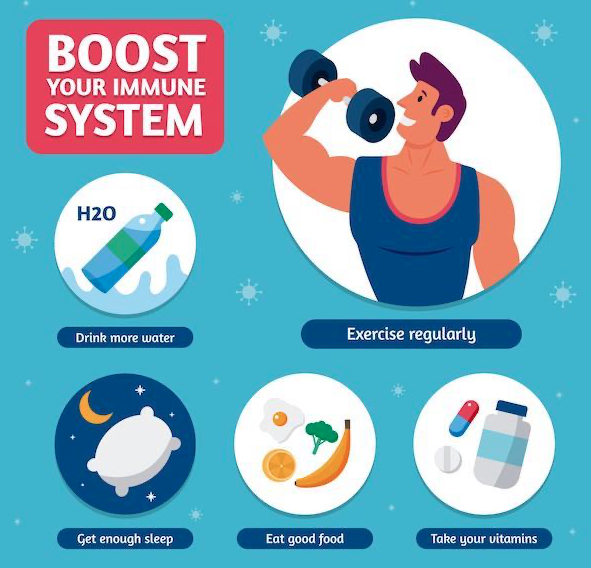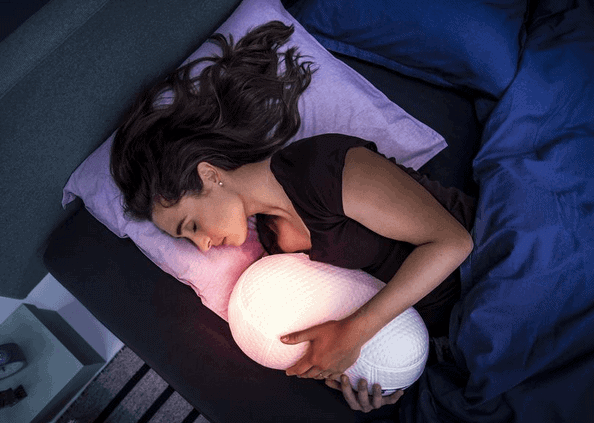4 Ways to Make Your Immune System Strong During Cold and Flu Season
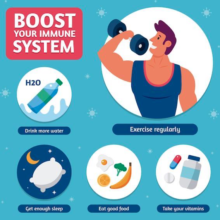
Make your immune system strong and improve your healthspan to boot by making lifestyle habits out of four actions that will improve your health both in the short and long term.
Update 11/5/22
Nearly one month into the fall season, it’s time to make your immune system strong so you can sail through the cold and flu season hale and hearty. There is advice about how to do this all over the Interwebs, but here I’m going to distill how to make your immune system strong down to four actions that need to become lifestyle habits. And I’m going to show how these actions are also important to do to improve your healthspan.
Essentially, in this post you’re going to learn what you can do to achieve both short and long term health benefits; a two-fer, if you will.
These are the four top immune system boosters we’re going to cover:
Let’s dig in…
1. Make your immune system strong by Exercising
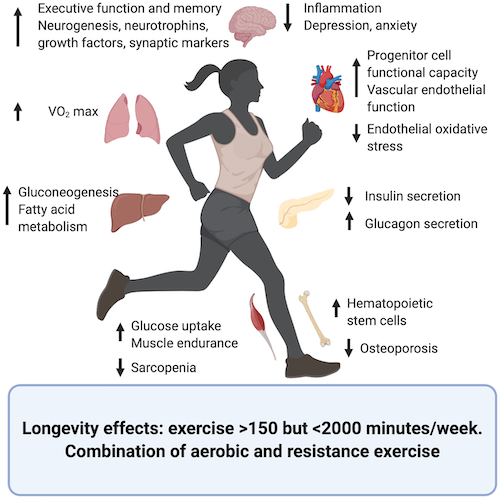
Credit: Carapeto PV, Aguayo-Mazzucato C. Effects of exercise on cellular and tissue aging. Aging (Albany NY). 2021 May 1313:14522-14543. https://doi.org/10.18632/aging.203051
Although it might be comforting to lay around on the couch huddled under a blanket as the weather chills your bones, doing so does nothing to enhance your immunity. Take a deep breath, throw off that blanket, get dressed and go outside and move!
A study published in 2011 led by David Nieman, a professor of biology at Appalachian State University who researches exercise, nutrition and immunology, followed more than 1,000 adults for three months. They logged various lifestyle habits, such as exercise, diet, stress and illnesses, such as cold and flu.
Guess what the best lifestyle factor was that reduced the likelihood of upper respiratory track infection?
Yup, it was physical activity.
“The No. 1 lifestyle factor that emerged was physical activity,” Dr. Nieman said, explaining that exercise is a great way to bolster your health and reduce your susceptibility to disease.
The study found that those who exercised five or more days per week were 43% less likely to be sick with an upper respiratory tract infection as compared to those who exercised for less than one day per week.
Can’t manage to huff and puff five or more days per week?
Well, you’re in luck, because like with a lot of things in life, something is better than nothing. In this case, those who did moderate exercise, such as walking quickly, for 20 minutes once per week were more resistant to cold and flu than those who resolutely clinged to their couches and blankets, sorta speak.
Why does exercise confer such immune-enhancing benefits?
We see this effect in part because exercise stimulates immune cells to “patrol the body” for virus-infected cells so that it can identify and eliminate them, Dr. Nieman said. Just a few hours of moderate exercise spread across a week is enough to get your immune cells circulating optimally, he said. And the exercises don’t have to be intense — just walking, dancing or “vigorous yard work” is enough to experience a boost in your health.
Exercise can improve your immune system because exercise stimulates immune cells by increasing the antibodies and white blood cells that fight disease; they then circulate more rapidly throughout your body, and detect illnesses earlier than they might have before becoming “stimulated” via exercise.
A 2019 study, also led by Dr. Nieman, goes quite a bit further in extolling the virtue of exercise upon the immune system. This study reviewed research discoveries in the “exercise immunology” literature that have received the most attention from investigators. The data from these studies support the claim that habitual exercise is capable of regulating the immune system and delaying the onset of immunosenescence — a process of immune dysfunction that occurs with age and includes remodeling of lymphoid organs, leading to changes in the immune function of the elderly.
Specifically, the data show that exercise can:
- Enhance vaccination responses;
- Lower numbers of exhausted/senescent T cells (cells specifically designed to fight infections they have not yet encountered);
- Increase T-cell proliferative capacity;
- Lower circulatory levels of inflammatory cytokines (i.e., decreased “inflamm-aging”);
- Increase neutrophil phagocytic activity (Neutrophils remove bacterial and fungal pathogens through a process known as phagocytosis);
- Lower inflammatory response to bacterial challenge,
- Improve natural killer cell cytotoxic (toxic to cells) activity, and
- Increase leukocyte telomere lengths (leukocytes are a type of white blood cell that fights pathogens, and telomeres are regions of repetitive DNA sequences at the end of a chromosome that protect them).
In addition to reducing your chances of succumbing to the cold or flu, I’ve already touched on how exercise improves healthspan, but there’s much more to say on the matter.
Exercise improves healthspan by treating 26 chronic diseases
A study published in 2015 (with 1,351 citations) entitled, Exercise as medicine – evidence for prescribing exercise as therapy in 26 different chronic diseases examines the evidence for prescribing exercise as medicine in the treatment of 26 different diseases:
- Psychiatric diseases: depression, anxiety, stress, schizophrenia
- Neurological diseases: dementia, Parkinson’s disease, multiple sclerosis
- Metabolic diseases: obesity, hyperlipidemia, metabolic syndrome, polycystic ovarian syndrome, type 2 diabetes, type 1 diabetes
- Cardiovascular diseases: hypertension, coronary heart disease, heart failure, cerebral apoplexy, and claudication intermittent
- Pulmonary diseases: chronic obstructive pulmonary disease, asthma, cystic fibrosis
- Musculo-skeletal disorders: osteoarthritis, osteoporosis, back pain, rheumatoid arthritis
- Cancer
That pretty much covers the range of chronic diseases, one or more of which eventually besets most of us and greatly impair our lifestyle, possibly leading to death, a definite lifestyle downer.
If you have or think you’re heading toward having one or more of the chronic diseases listed above, go to the study and check out the details about what type of exercise might be helpful, and why.
The exercises that were described as helpful “prescriptions” against these chronic diseases are a combination of cardiorespiratory and resistance training:
- Cardiorespiratory exercise refers to exercises that elevate your heart rate (fast walking, jogging, biking, swimming, circuit training)
- Resistance training refers to exercises that tax muscles in a way that builds strength and induces them to grow (calisthenics and weight lifting).
The prescribed approach to doing these exercises is to begin at low intensity, and gradually increase it on a progressive, consistent basis. The researchers also suggested that exercise novices seek the supervision of competent trainers to design exercise programs.
All three studies referenced here referred to the evidence that there’s an exercise sweet spot to make your immune system strong and improve healthspan; meaning, too little is insufficient, and too much is detrimental.
This j-curve from Dr. Nieman’s 2019 study represents the exercise sweet spot that confers both immunity and healthspan benefits:
The Exercise/Immunity Sweet Spot
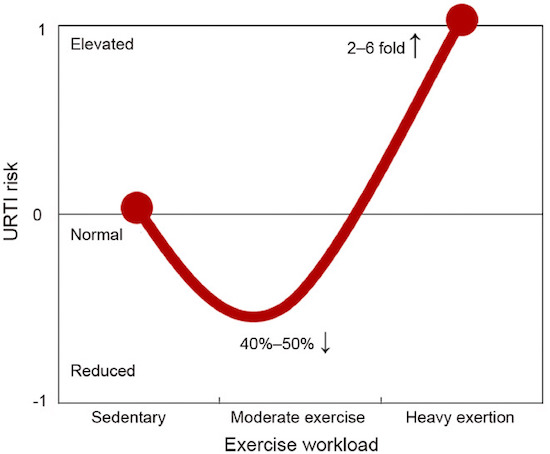
The J-curve model above shows the relationship between the exercise workload continuum and risk for upper respiratory tract infection (URTI). Other factors such as travel, pathogen exposure, sleep disruption, mental stress, and dietary patterns may influence this relationship as well.
You can see from the graph that the ideal level to minimize the risk of URTI by 40 to 50% is moderate exercise. Heavy exertion can actually elevate the risk of URTI due to various stresses it puts upon the body. Of course, one person’s heavy exertion is another’s moderate effort, which is why there is no “one size fits all” prescription, and underscores the wisdom of obtaining exercise guidance from a professional.
Naturally, all that huffing and puffing needs to be supported by good nutrition. Unsurprisingly, the right nutrition both supports immunity and healthspan.
2. Make your immune system strong by a Healthy Diet
Too bad our society does not present us with an owner’s manual once we’re old enough to read that details the optimal food and drink we need to sustain a healthy, vital body. Cars have them. Any car manual will tell you what fuel it needs. You wouldn’t fill up your tank with salt water when it needs 80+ octane unleaded gas (or better yet, a zap of electricity), but we fill ourselves with crap all the time.
What you choose to eat and drink is one of the most important lifestyle choices that can influence your immune health and overall healthspan.
If you’re serious about getting your diet right, read my post, The Blue Zone Diet Will Transform You.
Here’s the lowdown:
- Eat foods that are high in flavonoids — chemical compounds found in plants that can help the body fight inflammation and illness. This includes a variety of brightly colored fruits and vegetables like berries, citrus fruits, red cabbage and kale, as well as herbal tea, 80%+ dark chocolate, buckwheat and legumes. (See this list)
- Foods rich in flavonoids are also high in fiber, an very important food source for the beneficial gut bacteria that have a profound influence on your health.
- Eat more greens, cruciferous vegetables and nuts, especially walnuts.
- Eat less meat, especially meat that comes from grain-fed animals injected with hormones and antibiotics.
- Eat some fish, like salmon.
- Drink plenty of water, as this is especially important to prime the lymph system, the body’s immune system highway that carries pathogen-fighting cells where they’re needed. Since lymph fluid is 96% water, if you’re dehydrated, the lymph system can’t do its job.
- Avoid highly processed and fatty foods, which can cause insulin spikes and inflammation that wreak havoc on your immune system, hampering its ability to target viruses.
Research has also shown that exposure to cigarette smoke and drinking of alcohol in excess — more than two drinks a day for men or one drink a day for women — can suppress your immune system.
If your diet is SAD (Standard American Diet), you might want to try supplements. The Life Extension brand has a good multi-vitamin/mineral called One-Per-Day.
Although vitamin D and zinc may not prevent illness or boost immunity, there is some evidence that both might help people get better quicker. The daily recommended dose for vitamin D is 1,000-2,000 international units and 25 milligrams for zinc. Of course, sunlight is also a good way to get your vitamin D. Brazil nuts are loaded with zinc, so don’t eat more than two per day if you’re low in zinc.
Make sure you check the labels of supplements for a third-party analysis of quality, such as the insignia for USP, or United States Pharmacopeia, a nonprofit organization that develops standards for medications and other substances. It’s an indicator that the vitamin or mineral ingredients have an FDA-approved or accepted use, have been used extensively without a significant safety risk and also meet USP quality standards.
3. Make your immune system strong through Restorative Sleep
Research indicates that not getting enough sleep, or sleep of good quality can reduce your body’s capability for fighting off infections.
According to the National Institute for Occupational Safety and Health (NIOSH), sleep loss negatively affects the immune system in three ways:
- Reducing the body’s production of natural killer (NK) cells, which in turn increases the risk for cancer and viral infections.
- Generating inflammatory cytokines, which heightens the risk for cardiovascular and metabolic disorders
- Reducing the production of antibodies, which help fight viruses and other infections
Restorative sleep also helps regulate stress. Chronic stress can reduce the body’s response to vaccines and infections, as well as increase inflammation — and all of this can increase your susceptibility to infection and other kinds of chronic diseases that reduce healthspan.
People’s sleep needs do differ, but aim for seven to eight hours daily. Also develop a regular routine to:
- Prepare your body for sleep (bath, no screens, read), and
- Go to bed and arise at the same time.
This means no mobile phone, tablet or computer screen for an hour before bed and no reading in bed. If you’re tossing and turning for at least 15 minutes, stop wrestling with the pillow — get up and do something boring until you’re ready for slumber.
Melatonin supplements of 1 to 3 milligrams doses, sublingual, may help you sleep; whereas doses of 5 milligrams to 10 milligrams may be useful to support the immune system. Source Naturals Melatonin is a highly rated brand.
If you need extra help to get restorative sleep, consider ProHealth’s Sleep Longevity brand. (Disclaimer: I’m an advisor to the company.)
For more on restorative sleep, read my post: 7 Sleeping Tips for Your Ultimate Rest and Restoration.
4. Make your immune system strong by Pandemic Protocols
I’ve written a lot about the Covid pandemic and Sars-CoV2, and always feel a bit of trepidation when doing so, given how politicized this topic is, as if the facts and evidence about Covid has anything to do with political affiliation.
Nonetheless, I’m going to bare myself to potential battering by suggesting that — according to virologists (I’m guessing they know something about viruses), probably the most important thing that people can do right now is to get both their up-to-date Covid booster shots and their flu vaccines as soon as possible, given that flu and Covid-19 cases will almost certainly go up this fall and winter.
It might also make good sense to wear face masks in public, indoor spaces for the next few months should your area of the world experience a surge in either Covid or flu. Doing so will help protect you against all sorts of viruses, not just the coronavirus, especially if you have a weaker immune system.
And, of course, there’s that old tried and true exhortation to wash your hands. Washing your hands is highly effective to keep people healthy. Just think of all the stuff you touch on any given day and how often you touch your face. The average person touches his/her face about 23 times an hour! [source]
Update 11/5/22: New Covid variants are circulating. Coronavirus-related hospitalizations are increasing in a number of states, including Arizona, Indiana, Illinois, Nevada, Nebraska, Oklahoma, South Dakota and Wisconsin. At least half a dozen versions of the Omicron virus are vying for dominance in the U.S. Healthy adults are more likely to be infected even after vaccination or after a previous infection with a different variant. A few preprint studies indicate that prior infection or vaccination might not produce antibodies that protect strongly against the new subvariants. The good news is that most people who are up to date on their vaccines and who get treatment early with Paxlovid (an oral antiviral medication) or with remdesivir (an injectable antiviral) are going to be fine, or experience mild illness.
So, now you know the four ways to make your immune system strong during the cold and flu season, as well is improve your healthspan over the long haul:
Now the question is, will you do any of it?
If you want to learn how to form new lifestyle habits, I’ve got you covered. Just go here and learn about habit making.
Last Updated on July 7, 2023 by Joe Garma

